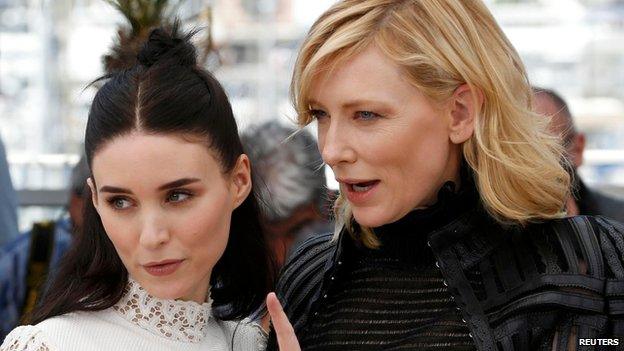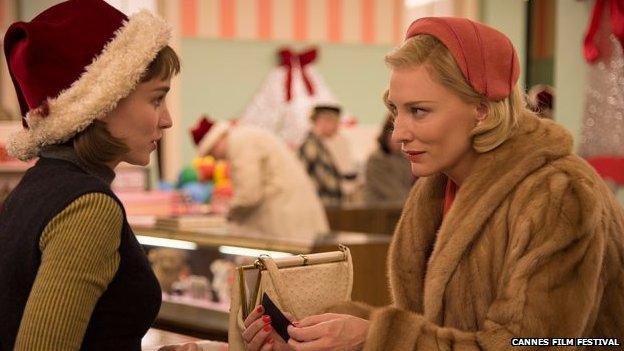Cate Blanchett film Carol tipped for Cannes glory
- Published

Cate Blanchett was joined in Cannes by her co-star Rooney Mara, best known for The Girl With the Dragon Tattoo.
A film starring Cate Blanchett and Rooney Mara about an illicit lesbian romance in 1950s New York has been hailed by critics at Cannes.
Carol - based on a 1952 novel by Patricia Highsmith, author of The Talented Mr Ripley - is winning rave reviews for its lead performances.
Blanchett denied speculation suggesting she drew on her own early gay relationships to create the role.
But she added, "In 2015, the point should be: who cares?"
The film, directed by Todd Haynes, follows the blossoming relationship between a glamorous married woman (Blanchett) and an impressionable shop girl (Mara).
'Private affair'
Last week, double Oscar-winner Blanchett reportedly admitted to Variety magazine she had many past female partners.
However, at a news conference in Cannes, the 46-year-old was quick to scotch reports of a lesbian past.
"From memory, the conversation ran, 'Have you had relationships with women?' And I said, 'Yes, many times. If you mean I've had sexual relationships with them, the answer is 'No' - but that obviously didn't make it to print," said Blanchett.
"Call me old-fashioned but I thought one's job as an actor was not to present one's boring, small, microscopic universe but to make a psychological connection to another character's experiences.
"My own life is of no interest to anyone else. Or maybe it is. But I certainly have no interest in putting my own thoughts and opinions out there," she said.

"[Carol's] sexuality is a private affair. What often happens these days is if your are homosexual, you have to talk about it constantly, the only thing, before your work.
"We're living in deeply conservative times,'' said Blanchett. "And if we think otherwise, then we're very foolish.'"
The film is seen by some critics as a companion piece to Haynes' Far From Heaven, about an illicit romance between a white woman and a black man, also set in the 1950s.
Writing in the Hollywood Reporter, external, Todd McCarthy praised "Haynes' fastidious, intelligent and somewhat leisurely adaptation" while Peter Bradshaw in the Guardian, external called it "a creamily sensuous, richly observed piece of work, handsomely detailed and furnished."
Screen Daily's Tim Grierson, external concluded: "It's such stately, evocative, confident filmmaking, the only reservation being that it's also a bit chilly."
In 2013 La Vie d'Adele (Blue is the Warmest Colour), a French film about a lurid lesbian affair between two students, won the festival top prize, the Palme d'Or, but met with controversy over its anti-feminist tone and the fall-out between the male director and his female stars.